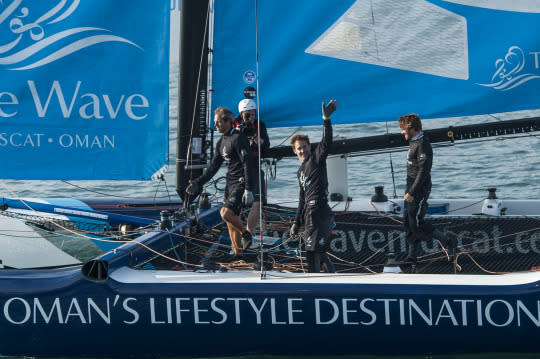The Big Interview: David Graham, Oman Sail
The Gulf’s oil money has created an established a hub for major sporting events but one nation is going against the grain – steering away from the bidding wars to create a genuine legacy for its people.

Just when it seems as if every major global sport is selling its soul, or at least renting one of its showpiece events to a petro-dollar-rich Gulf nation, a fresh vision of the future is being articulated. And it is a welcome view, a fresh voice that talks sense.
Step forward Oman, a country that has chosen to take a step into the past to create its own cultural and sporting future in the new regional landscape of the Middle East. And to deliver a real legacy for the Omani people.
‘Buying’ a place on the F1 calendar or the right to host the World Cup finals or one of the many international cricket, golf or tennis events that have begun to proliferate across this region has ensured that Abu Dhabi, Bahrain, Qatar and Dubai have gained widespread television coverage and attracted tourists for something other than shopping.
But this phenomenon, successful as it has been in some cases, has not been without attendant problems, not least huge costs and, often enough, widespread controversy.
A major sport will pitch up to run its event with few of the indigenous population involved – in most cases, they are largely run by their own staff or selected imported experts, especially in ‘front of house’ roles. And the hosts will soon find their human rights record being put under an unwelcome media microscope that attracts as much attention as the phenomenal budgets laid aside to build the necessary infrastructure from scratch.
It is a trade-off that works for some, but not for everybody, according to David Graham, who as Chief Executive Officer of Oman Sail has been entrusted with reviving a maritime tradition in a sporting context to boost Oman’s tourism and, with it, the native people.
He believes, as does his boss, the Sultan of Oman, who is widely described as a benevolent autocrat, that a long-term plan for sport’s role in that country is essential for its success.
“In 2008 we had nothing,” he said, referring to the start of the Oman Sail initiative. “We had a history of sailing, but that was it. Now, in 2015, we are aiming to have success in qualifying for the Olympic Games and, from there, to go on and develop a serious pathway into the future.”
Few sportsmen, racing drivers or athletes have shone in their home events in Abu Dhabi, Bahrain, Dubai or Qatar.
That is a statement that Graham does not want to extend to embrace Oman. Instead, he wants to see the creation of Oman Sail lead the way into international competition and identity, but with Omani sailors and sportsmen capturing the imagination of their countrymen and the region.
“Oman Sail is about a country, we are not in an arms war about pitching to host a World Cup or the Olympics or any other kind of mega-event, including F1,” he explained. “There is a lot of substance behind what we are doing.
“The country has selected a sport that has a deep meaning and a tradition for its people. We have created a professional team that has been led by specialists we have employed, but we have introduced Omanis and we have a great group now, a really good top racing team.”
Oman Sail’s MOD70 Musandam-Oman Sail arrived in Plymouth on August 19 after almost three days at sea in the famous annual Fastnet Race from Cowes, on the Isle of Wight.
It was fourth in class, finishing behind Spindrift 2, the world’s fastest boat. Already, crew members are being approached by rival outfits, including Ben Ainslee Racing, Britain’s challenger for the America’s Cup - an event that, reportedly, approached Oman as a prospective host. Without success.
For Graham, the future for Middle East sport is about developing indigenous involvement in hosting and competing in major international championships that fit with their culture instead of throwing their dollars at the world’s ‘mega’ events in a bid for global recognition.
“There really is a lot of authenticity in our programme,” he said in an interview conducted in Cowes ahead of the Fastnet Race. “We are involving people in our development programme through sport in schools and we are the envy of our neighbours.
“In terms of events that we bring to our country, we are interested in developing high performance events – as in cycling with the Tour of Oman – that are sustainable and do not bring high costs. And they must be sports that will involve Omanis.
“We want them involved in everything – in the negotiations to bring the event to their country, in building and managing a team for the event and teams to compete in it and in the marketing and public relations too. We want to grow these events in sports that suit Oman.
“For us, it’s about having a stable market. It’s not just about selling, or buying, something and then a circus comes into town and runs its own event and then leaves. For us, it’s about the real legacy of what we are doing.
“For example, the cycling (road race) world championship is a good event for Oman. We have the roads and the infrastructure and sailing has the right kind of profile, similar to sailing. It is a better fit for us than football.”
Ultimately, he said, it is not about money.
“Money can buy you an event, but the question then is really about the legacy of that event. And by that I mean the legacy for the people of that country.”

 Yahoo Sport
Yahoo Sport 





































